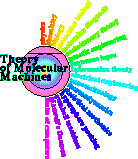
The graph is also available in PostScript: xyout.ps.

The results are indeed roughly Gaussian and close to zero. The histogram is also available in PostScript: histogram.ps

Dembski stated in his book No Free Lunch (page 212):
The No Free Lunch theorems show that evolutionary algorithms, apart from careful fine-tuning by a programmer, are no better than blind search and thus no better than pure chance.The ev program is an evolutionary algorithm that shows that without fine tuning the selection process leads to an information gain. To evaluate how much better than chance the ev results are, is we need to do a control. What happens in an ev simulation when there is no selection? One would expect there to be no information gain and any information gain under those circumstances should be "no better than chance". This then forms a baseline by which we can measure how much better the ev algorithm does using selection than it does on chance alone. MATERIALS AND METHODS
The cleanest way to test this is to use the standard example from the ev paper. According to my notes in the ev program documentation 'see also' section, this is the "Parameter file for selective phase in the paper: evp.selection".
I set the parameters to run to 2000 generations where things should have stabilized.


There is indeed a roughly Gaussian distribution around zero bits of information when the simulation is run with no selection. According to the histog the mean is 0.11092 bits with a standard deviation of 0.29928 bits. Using calc, we find (noselection.calc, mkcalc, noselection.result) that this is 12.99 standard deviations from 4.0 bits. It is hard to compute the probability because it is so low. Calc gives 0.00e+00 +/- 4.66e-10. That is, it is zero with a variation of 10-10!
This control experiment shows that when the ev program is run without selection there is no information increase. Therefore we can attribute the information increases observed with selection on entirely to that selection. In other words, an evolutionary algorithm does far better (almost 13 standard deviations!) than 'pure chance' which is the situation when there is no selection. This falsifies Dembski's statement about No Free Lunch Theorems.
![]()

Schneider Lab
origin: 2002 March 3
updated: 2002 March 7
![]()